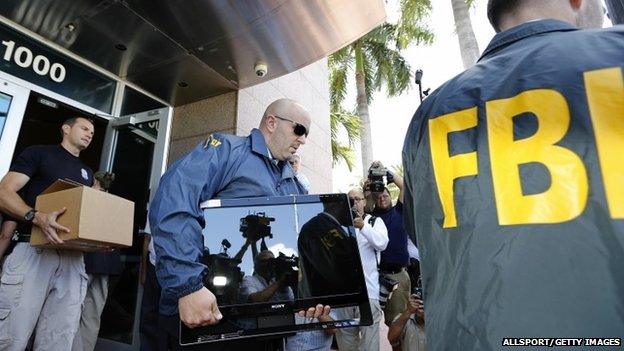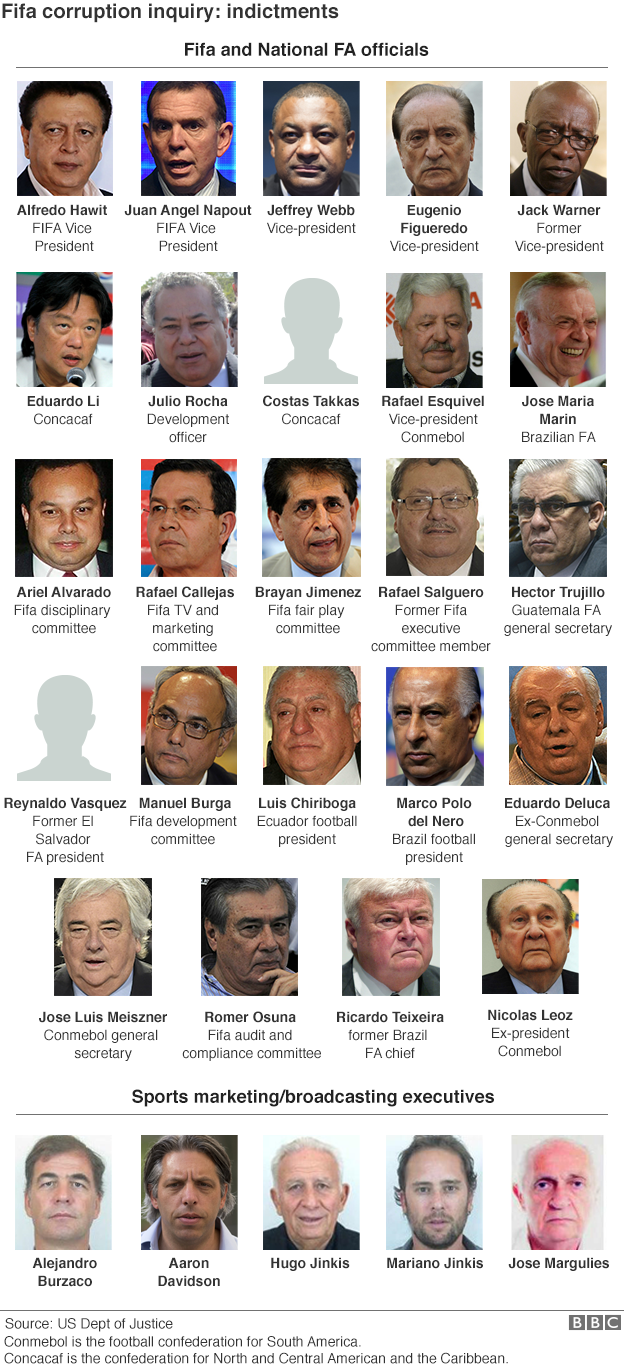Fifa corruption crisis: Key questions answered
- Published

World football has been convulsed by the US investigation
Fifa, football's world governing body, has been engulfed by claims of widespread corruption since summer 2015, when the US Department of Justice indicted several top executives.
It has now claimed the careers of two of the most powerful men in football, Fifa President Sepp Blatter and Uefa President Michel Platini, after they were banned for eight years from all football-related activities by Fifa's ethics committee. A Swiss criminal investigation into the pair is also continuing.
Fifa's president Sepp Blatter has always denied any wrongdoing - but in September, he too was made the subject of a Swiss criminal investigation, launched alongside the US inquiry.
The scandal erupted in May, with a raid on a luxury hotel in Zurich and the arrest of seven Fifa executives - conducted at the behest of the US authorities.
In May the US indicted 14 current and former Fifa officials and associates, external on charges of "rampant, systemic, and deep-rooted" corruption following a major inquiry by the Federal Bureau of Investigation (FBI).
And in December, 16 more officials were charged following the arrest of two Fifa vice-presidents in at the same hotel in Zurich. Former Brazil football federation chief Ricardo Teixeira was among those accused of being "involved in criminal schemes involving well over $200m (£132m) in bribes and kickbacks".
Why does this matter?
Fifa is the body responsible for running world football. It has recently been dogged by accusations of corruption, particularly after awarding the 2022 World Cup to the tiny but rich and influential Gulf state of Qatar. In December 2014, Fifa chose not to release its own investigation into corruption, instead releasing an executive summary which it said exonerated the bidding process. The report's independent author, American lawyer Michael Garcia, resigned in protest.
The World Cup is the most-watched sporting event in the world, larger even than the Olympics. It generates billions of dollars in revenue from corporate sponsors, broadcasting rights and merchandising. These arrests and investigations cast doubt over the transparency and honesty for the process of allocating World Cup tournaments, electing its president, and the administration of funds, including those earmarked for improving football facilities in some of Fifa's poorer members.
Is Sepp Blatter still Fifa president?
This is unclear. He was already suspended, so he was president in name only. Speaking after the verdict was delivered, he maintained that he could only be stripped of the presidency by a vote including all the member nations of Fifa. There is no precedent for these events so the point at which he no longer has the title of president is unclear. However, the one thing we do know is that he is not running the organisation.
Is this the end for Sepp Blatter and Michel Platini?
Yes, unless they win the appeals they intend to lodge against the charges. Mr Blatter had already said he would step down as Fifa president in February but the eight-year ban will make this immediate.
Michel Platini had hoped to run as a candidate to replace Mr Blatter but the ban on him will halt these ambitions. He will also have to step down as the head of the European football association (Uefa). The bans would also likely mean that the two men would fail Fifa ethics standards if they ever tried to return.
What were they accused of?
They were found guilty of breaches surrounding a £1.3m ($2m) "disloyal payment" made to Platini in 2011. The Fifa ethics committee said that pair had demonstrated an "abusive execution" of their positions.
They have both maintained that the payment was for work by Mr Platini as the president's advisor in 2002. Mr Blatter has maintained that Fifa did not have enough money to pay Mr Platini at the time, so they agreed to delay payment.
What next?
Fifa is already holding a presidential election in February to replace Mr Blatter so this will continue as planned. Uefa will also have to hold elections to decide on a new head, but they may well wait until after Fifa has picked a new president.
Both Mr Blatter and Mr Platini were already suspended and so were not running their organisations. Fifa will continue to be run by Fifa vice-president Issa Hayatou until after elections in the new year. Uefa will also continue to be run by its vice-president Angel Villar Llona, who is also head of Spain's football association.
Why were the officials accused?
The FBI has been investigating Fifa for the past three years. The investigation was initially sparked by the bidding process for the Russia 2018 and Qatar 2022 World Cups, but was widened to look back at Fifa's dealings over the past 20 years.
The Department of Justice's indictment says that the corruption was planned in the US, even if it was then carried out elsewhere. The use of US banks to transfer money appears to be key to the investigation.
There is a separate criminal investigation by the Swiss attorney general, which has named Mr Blatter as a suspect. It was evidence unearthed during this investigation that led to his and Mr Platini's Fifa bans.
What is alleged?
Swiss prosecutors have accused Mr Blatter of criminal mismanagement or misappropriation over a TV rights deal and of a "disloyal payment" to European football chief Michel Platini.
Meanwhile, the US authorities have charged 14 defendants with racketeering, wire fraud, and money laundering conspiracies. The 47-count indictment, unveiled in a US federal court in New York, said the defendants participated "in a 24-year scheme to enrich themselves through the corruption of international soccer".
A key figure is Charles "Chuck" Blazer, former general secretary of the Confederation of North, Central America and Caribbean Association Football (Concacaf), who is co-operating with US prosecutors.
He has said that between 2004 and 2011:
he and others on the Fifa executive committee agreed to accept bribes in connection with the selection of South Africa as the host of the 2010 World Cup
one of his co-conspirators received a bribe in Morocco for its bid to host the 1998 tournament, which was eventually awarded to France
he and others also accepted bribes in connection with broadcast and other rights to the Concacaf Gold Cup tournament in 1996, 1998, 2000, 2002 and 2003
Much attention has been focused on a $10m deal that US prosecutors say was a bribe to secure the 2010 World Cup for South Africa.
An email obtained by a South African newspaper, external appears to show that the then South African President, Thabo Mbeki, and Mr Blatter agreed to the deal. In the email, Fifa Secretary-General Jerome Valcke wrote to a South African minister asking when the transfer could be made, and saying that both Mr Blatter and Mr Mbeki had discussed the matter previously.
The South African government insists it was a legitimate payment to promote Caribbean football, but documents seen by the BBC suggest then Fifa vice-president Jack Warner used the payment for cash withdrawals, personal loans and to launder money.
Michael Lauber, the Swiss attorney general, has said that he is investigating suspicious activity around Fifa's Swiss bank accounts.
His team is combing through a "huge amount" of seized data, focusing on 53 "banking relations" reported by the Swiss anti-money laundering framework.
Who are the accused?
Apart from Mr Blatter, the most senior figures accused are football powerbrokers in North America, Latin America and the Caribbean.
They are connected to Concacaf, the continental confederation which operates under the Fifa umbrella and is essentially in charge of football in that region. One of its key roles is helping to agree World Cup TV and sponsorship deals in the US.
Jeffrey Webb is the head of Concacaf and was widely seen as being groomed as a successor to Fifa president Sepp Blatter. He has been extradited to the US.
His predecessor, the above-mentioned Jack Warner, has also been indicted. Mr Webb replaced Mr Warner after he was forced to step down after an internal Fifa fraud inquiry.
Latin American football chiefs also figure heavily in the list. There are two former presidents of Conmebol, which represents South American football nations: Nicolas Leoz and Eugenio Figueredo.

Switzerland is processing US extradition requests for several officials. Mr Warner is on bail in Trinidad pending extradition to the United States. Mr Leoz is currently under house arrest in Paraguay.
Aaron Davidson, head of a sports marketing firm's US division, has pleaded not guilty in a federal court in New York to charges including racketeering conspiracy, wire fraud and money laundering, and has been released on bail, external. Former Fifa Vice-President Juan Napout has also pleaded not guilty.
Four individuals - one of them Chuck Blazer - have already pleaded guilty.
How much money is involved?
Massive amounts.
The US indictment alleges that US and South American sports marketing executives paid and agreed to pay "well over $150m" in bribes and other illegal payments to obtain lucrative media and marketing rights to international football tournaments.
That does not include other possible alleged corruption around the world.
Fifa makes nearly all its revenue from the World Cup. Last year's tournament cost the host country Brazil an estimated $4bn, and yet Fifa made more than $2bn from the tournament via sponsors, the sale of broadcasting rights and merchandising. The costs of the next two World Cups are expected to dwarf this: Qatar 2022 is reported to be costing above $6bn.
And what next for football?
The future of the 2018 and 2022 World Cups is a major question.
The US indictments focus on historical corruption but not the forthcoming World Cups. But the FBI - and a separate Swiss investigation - are now looking into the allocation of those tournaments. However, it would take overwhelming evidence to run the bidding processes again.
In practical terms, moving the 2018 Russia World Cup would be fraught with difficulty. Very few countries have the stadiums, infrastructure or money to host the event at such short notice. Even most English stadiums would need a major refurbishment to meet Fifa standards. Germany offers the best option, having hosted the 2006 World Cup.
Qatar is more vulnerable and has been dogged with controversy and allegations of corruption ever since it was awarded the tournament. However, it has already seen out several corruption scandals, an unprecedented move from a summer to winter tournament, and a scandal over the treatment of migrant workers.